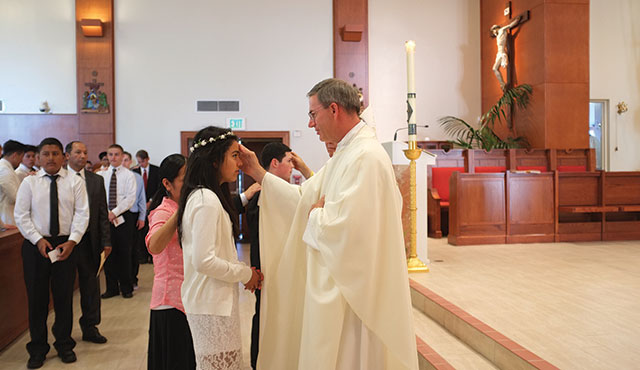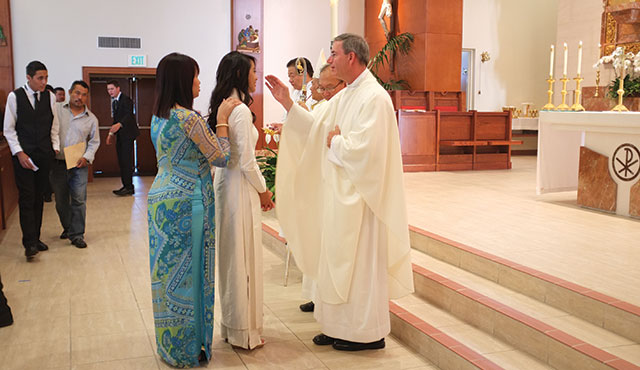The first step in our initiation into Christian life is the sacrament Baptism. In fact, because of your Baptism you are Christian. But in Catholic teaching, Baptism is just the beginning of a full life in Christ. For most children it is a gift to them from their parents while they are still infants.
The sacramental grace of Baptism works within the child’s soul to encourage maturity in faith and learning. It is followed by two other very important rites of initiation that are uniquely Catholic in their sacramental nature and theology.
Some people look on Confirmation as something like the Jewish Bar Mitzvah or Bat Mitzvah, however, according to Katie Dawson, director of Parish Faith Formation for the Diocese of Orange, “Confirmation isn’t a coming of age ritual. The rites of initiation are Baptism, Confirmation and Eucharist, in that order. After the Bishop is given testimony as to our living out the life of Christ in faith, he then ‘confirms’ us in the faith.”
Theologically, the Eucharist is the pinnacle of our initiation or ‘communion’ with the Church. According to Catholic Answers, “In the early Church, sacramental initiation always involved the bishop; the bishop was the ordinary minister of both Baptism and Confirmation. However, pastoral practice changed as the Church expanded rapidly. When bishops could no longer be present at all celebrations of Baptism, they chose to retain a role in the process of initiation by continuing to be the ordinary minister of Confirmation. In the Latin Church, with the bishop as the minister of Confirmation, it is evident how this Sacrament can serve to strengthen the person’s bond with the Church and her apostolic origins. However, there are also times when the bishop entrusts the celebration of the rite of Confirmation to a priest, such as in the case of the Baptism of an adult or the reception of an adult from another Christian community into full communion with the Church.”
Confirmation also brings gifts – seven Gifts of the Holy Spirit to be exact. Wisdom helps us to see things as God sees them. Knowledge calls us to contemplation and prayer. Understanding is to know ourselves in light of God’s divine purpose. Fortitude or courage to trust that when we are strong in the face of evil we have faith that God is with us. The gift of Counsel or right judgment gives us the peace that, as St. Paul states, surpasses all understanding. Reverence or piety is to respect the things of God and the creation he has given us. And fear of the Lord, is not fear as we know it today, but wonder at the magnificence of God and the love He has for each of us.
Today, most confirmations take place in the teen years. Although confirmed in the faith, it doesn’t necessarily mean that confirmed teens will be stalwarts of the faith forevermore. In fact, they are confirmed just before they go off in the secular world that will lure them with all kinds of distractions, and distortions regarding faith and morals.
The rite of Confirmation draws many images and scriptural readings from Pentecost, and several passages in the Acts of the Apostles. Acts 19:6 contains one of many passages: “…And when Paul laid (his) hands on them, the Holy Spirit came upon them, and they spoke in tongues and prophesied.” Sometimes, the Holy Spirit can grab hold of a young soul and if the grace is accepted they go forth and never stray far from the faith. In others, the grace may lay dormant until, years later, when life becomes more complex the adult is drawn back through grace to God and the Church. It is still all a question of free will.
According to Dawson, “As the newly confirmed grow and mature they can become more open to the grace from their Confirmation. For example, in college they may be able to pass a test on a great and complex work of literature, but they probably won’t fully understand it until they have had more life experience.” That is why Confirmation is so important, it is like an energy overlay on our Baptism, calling us to live our life in Christ – no matter how long it takes or how many challenges come before us.


